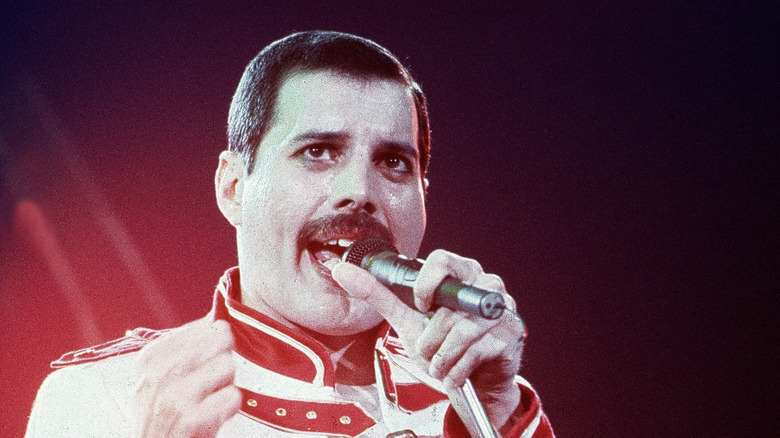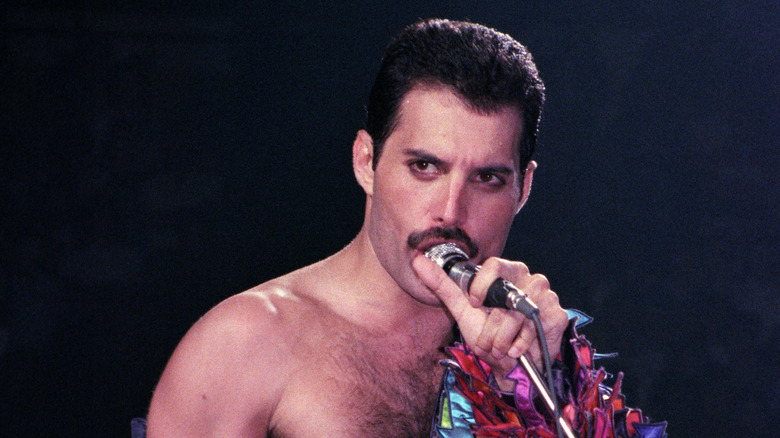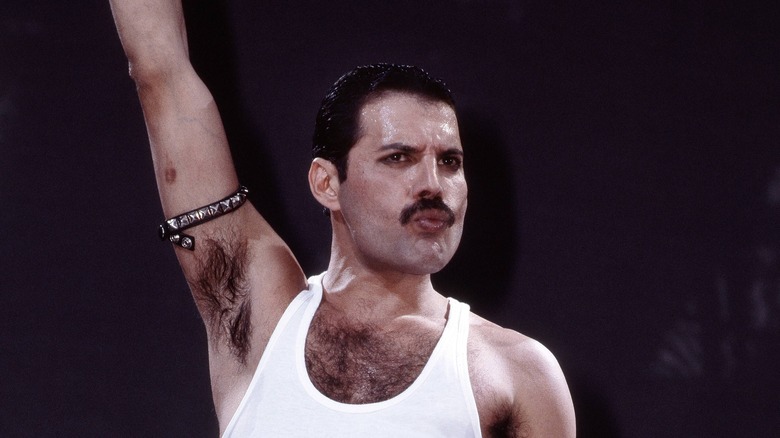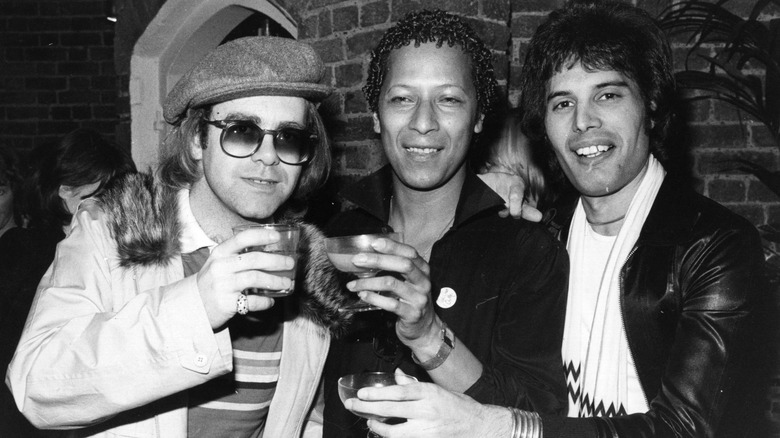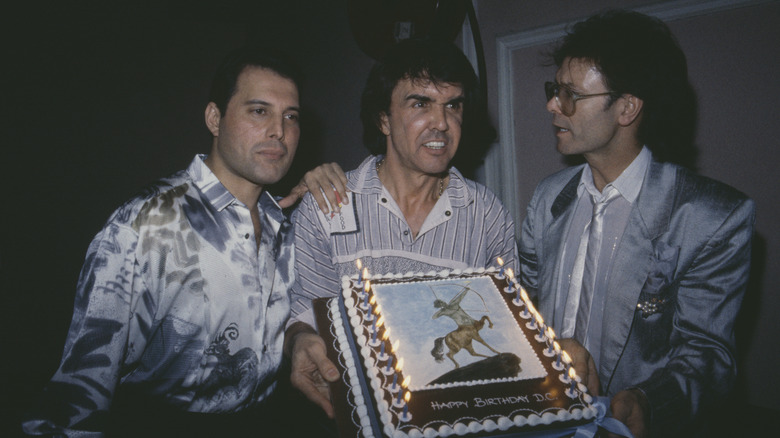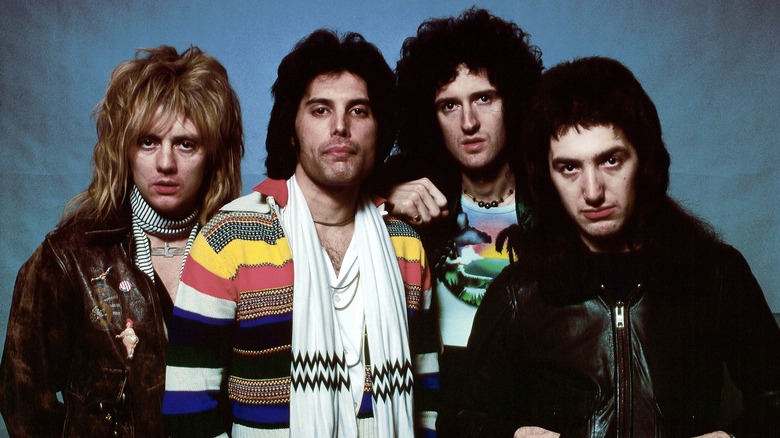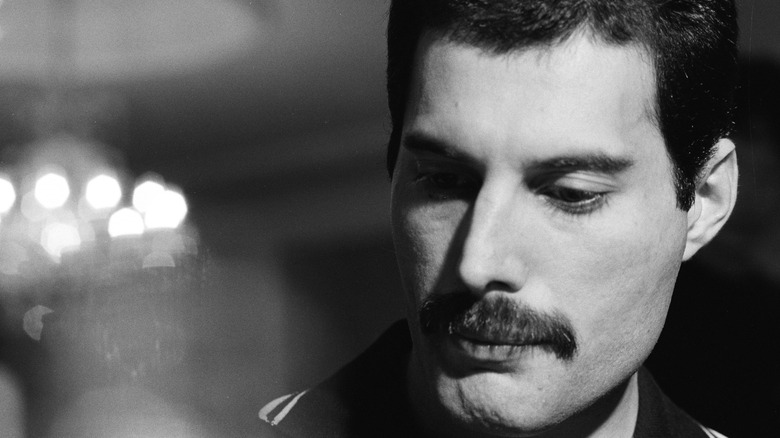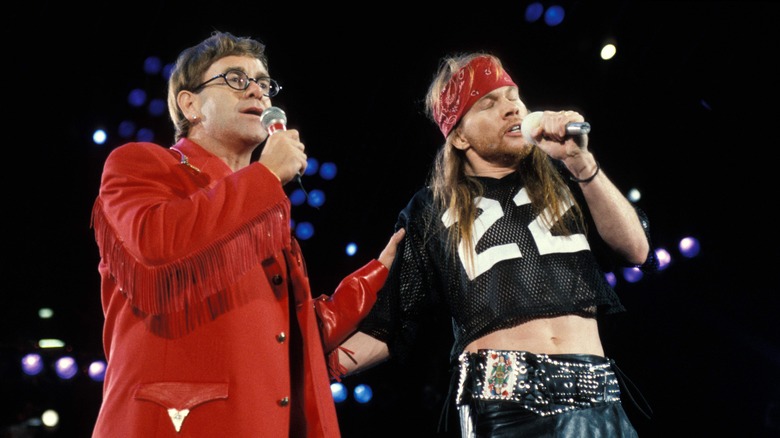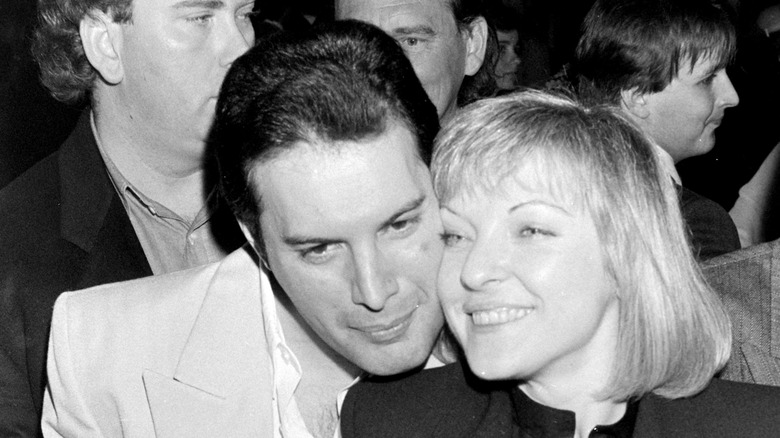What It Was Like The Day Freddie Mercury Died
The British hard rock band Queen had reached the late 1980s as one of the biggest stadium acts in the world. They had dominated the charts on both sides of the Atlantic with several studio albums, and some of the decade's most popular songs were Queen hits. "Crazy Little thing Called Love" and "Another One Bites The Dust" had both topped the Billboard Hot 100.
But secretly, Queen was in crisis. As only the band and their closest friends knew, their magnetic frontman, Freddie Mercury, whose incendiary performance at the 1985 Live Aid concert at London's Wembley Arena had gone down in history as one of the most iconic concerts of all time, had retreated from the limelight. Rumors were circulating about his health as a result of press intrusion into the condition of the rock icon as he went about his life in London.
Indeed, Mercury had been sick for several years by the time 1990 rolled around, but it was only in November 1991 that he would finally go public with his illness, just hours before his tragic death on November 24, 1991, at the age of 45. Here's how the story unfolded, and how Queen managed to continue despite their loss and learn to honor Mercury's incredible legacy.
Fans were reeling from news of his diagnosis
On November 23, 1991, fans of Freddie Mercury received some terrible news: their musical hero had been diagnosed as HIV positive and had AIDS, a fatal autoimmune disease caused by HIV. In a statement, the usually private musician informed his fans:
"Following the enormous conjecture in the press over the last two weeks, I wish to confirm that I have been tested HIV positive and have AIDS. I felt it correct to keep this information private to date to protect the privacy of those around me. However, the time has come now for my friends and fans around the world to know the truth and I hope that everyone will join with me, my doctors and all those worldwide in the fight against this terrible disease. My privacy has always been very special to me and I am famous for my lack of interviews. Please understand this policy will continue" (via Euronews).
As Mercury's statement noted, there had been feverish speculation about the singer's condition, with published photographs showing him looking thin and frail. Though knowledge of HIV and AIDS had been growing among the general public for around a decade by the time of Mercury's disclosure, the news was deeply shocking. He was the biggest name to be confirmed as having the disease, and the statement also turned attention to Mercury's sexuality, as he had never publicly confirmed he was gay, but also made no effort to hide it.
His death was sudden
Just 24 hours after Freddie Mercury told the world that he was HIV positive and had AIDS, he was on his deathbed at his London home, succumbing to the effects of bronchial pneumonia. With a weakened immune system, the illness took hold of him quickly.
News outlets that had broken the news of Mercury's diagnosis to his fans now shared that Queen's electrifying frontman was no more. After months of nothing but rumor and speculation, many were stunned by the sudden barrage of tragic news stories, and few expected events to move so quickly, not least Mercury's close friends. Mercury had first been diagnosed with HIV back in 1987, sharing the information only with his inner circle. Though his health was certainly deteriorating, those closest to him, such as Peter Freestone, who helped care for Mercury in his final days, thought that he had more time left after he made his announcement to the world.
Freestone, who worked as Mercury's full-time personal assistant from 1980 until his death, has described his love for his friend and the job he held for more than a decade. But he has also described his shock at Mercury's death despite knowledge of his condition, posting on his blog: "There was no indication at that time that Freddie would slip away so quickly ... We all knew it could not be too long, but Freddie's doctor had said that he could be with us for quite a few days longer. I tend to feel that Freddie had decided he had had enough and it was time to go under his own terms."
Mercury was brave in the face of death
Freddie Mercury's longtime personal assistant and friend Peter Freestone claims Mercury was aware that his health was declining in the mid-1980s, which was why he decided to be tested for HIV. However, though Mercury went for the test, when his doctor called to give him his diagnosis, he reportedly avoided speaking to him, afraid that he would get the worst news possible. Treatment for HIV was still in its infancy at the time, unlike today, when the condition can be managed with regular medication. To be given such a diagnosis was practically a death sentence.
But as his friends and colleagues have made clear, when Mercury became aware of his condition he showed great resolve. According to Elton John, who was close friends with the Queen singer and who continued to receive gifts from Mercury up until the latter's death, it seemed that Mercury was unafraid of death.
Indeed, Mercury's bandmates have confirmed that despite his diagnosis and ailing health, he remained focused on his music. In the documentary "Queen: Days of Our Lives," guitarist Brian May explains that after Mercury sat his bandmates down, he explained his condition, but he didn't want to linger on it, and instead planned to dedicate his remaining time to making music as they had always done. For their final work before his death, Mercury shared songwriting credits with his bandmates, which reportedly brought the four men closer than ever before, while they all agreed to remain silent about his condition.
He had stopped his medication
Despite Freddie Mercury's diagnosis and his declining health, Queen did manage to return to the studio and continue to write and record music in the years leading up to his death. Some of these works are incredibly moving in retrospect, with full knowledge of Mercury's condition at the time. "The Miracle" was a defiantly optimistic album, which outlined Mercury's vision of the world. Elsewhere, in "These are the Days of Our Lives," Mercury offers a sign-off to the world, the famous video of which sees the legendary showman gaze into the eye of the camera to whisper: "I still love you." You can watch the music video — which, be warned, is a tearjerker — above.
What has emerged through the testimony of friends including Peter Freestone is the fact that on November 10, 1991, almost two weeks before his death, Mercury had ceased taking medication. ""He made all his arrangements ... I think he just felt and knew it was his time," said Freestone (via Smooth Radio).
""The quality of his life had changed so dramatically and he was in more pain every day," explained his lifelong partner Mary Austin in an interview with OK! Magazine (via the Express). "He was losing his sight. His body became weaker as he suffered mild fits ... One day he decided enough was enough and stopped all the medical supplements that were keeping him going."
He had his friends around him
Despite his immense fame, Freddie Mercury endeavored to live a private life, especially as his health began to fail him. He made clear his dislike of interviews and of celebrity culture for its own sake, preferring instead to surround himself with people who made him laugh.
Freddie Mercury's one-time girlfriend and lifelong friend Mary Austin lived with Mercury at his London home, and was with him until the end of his life. The two had met before Mercury's megastardom, when the singer was 24 and Austin was 19. Mercury described Austin as the woman who would have been his wife, as well as the love of his life — indeed, the song "Love of My Life" was reportedly written about her. Peter Freestone was also present, with the assistant's role transforming into that of nurse in Mercury's final months.
Freestone recalls that Mercury was so weak towards the end of his life that a bodyguard had to carry the singer downstairs so that he could view his art collection. Others continued to visit Mercury, including Dave Clark (pictured above, center) of the Dave Clark Five, who was reportedly at Mercury's bedside when he died.
Some corners of the press were unsympathetic
Sadly, while the history of LGBTQ+ lives and the struggle for equality and acceptance are widely honored today, attitudes toward HIV and AIDS as well as homosexuality were quite different in 1991. This was reflected in many of the news stories about Freddie Mercury's illness and death, especially in the notorious British tabloid press.
Indeed, while most major news channels were honoring Mercury as a singular artist and performer and fans were mourning his death from a disease which took so many lives prematurely in the 1980s and 1990s, some muckraking journalists and editors were seeking salacious angles from which to approach the story, with articles often spilling over into blatant homophobia.
Indeed, at a time when HIV was in some corners considered a disease that affected only gay men — it can, of course, be contracted by anybody who is sexually active with a carrier whose infection is not controlled by inhibiting drugs — some corners implied that Mercury's death was represented some moral justice for his promiscuity, an aspect of his life he had not attempted to hide in interviews. Talking to The Pink News, "Freddie Mercury: The Final Act" director James Rogan recalls his horror at some of the headlines he uncovered during the making of the documentary. "There were headlines like, 'I'd shoot my son if he had AIDS,' and ones where they'd catch you unawares and you'd read it and think: 'How did this manage to make it into print?' I just can't get my head around it."
The band was angry at Mercury's treatment
In the weeks following Freddie Mercury's death, many of the same tabloids who in his final months had published secretly taken photos of him looking frail focused on uncovering sensational details of Mercury's life on the London gay scene and accounts of his sex life. Grieving their loss, the other members of Queen were shocked by the treatment their friend and bandmate received in the press, an aspect of his death that they were still angry about years later, with his bandmate Roger Taylor describing the journalists who hounded him as "vultures" (per "Days of Our Lives").
"I have never got over his death," said Taylor. "None of us have. I think that we all thought that we could come to terms with it quite quickly, but we underestimated the impact his death had on our lives. I still find it difficult to talk about. For those of us left, it is as though Queen was another lifetime entirely" (via Rolling Stone).
The news changed perceptions of AIDS
In "Queen: Days of Our Lives," Freddie Mercury's bandmates explain how they essentially closed ranks and lied to the world about the singer's condition, which was necessary to prevent his life descending into a media circus and preventing him from spending his last years working, which is what he wished to do. Producer Dan Hall identified the actions of the other members of Queen, who stood by their friend and also publicly denounced the vilification of homosexuality after Mercury's death, as fine examples of solidarity.
As many news reports from the time noted, Mercury's death caused discourse around HIV and AIDS to reach fever pitch, coming fast on the heels of several other news stories around the disease, including the diagnosis of basketball star Magic Johnson and the British theater director Tony Richardson. Mercury's disclosure contained a rallying cry to the world to combat the deadly disease, the consequences of which were written large a day later. Campaigners believed that the tragic death represented a turning point in the history of HIV and AIDs, changed how it was viewed by the public, and contributed to it being taken seriously as a major health crisis.
Fans brought flowers
News of Freddie Mercury's death shook his fanbase, especially those living in London where his final moments played out. As fans grappled with their feelings over the tragic loss, Mercury's Kensington home seemed the logical destination for one young man who, in front of the cameras of the world's press, arrived with a bunch of roses that were left on the step of Garden Lodge. "I've put down [in the note] 'To Freddie, one of the greatest rock singers who ever lived, from one of his loyal fans,'" he explained (featured above).
Before long, Mercury's home became a place of pilgrimage for countless fans, who came to pay their respects and offer their condolences. As later news reports showed, the house was soon inundated with flowers and mementos, which from then on became a shrine to his memory. It remains a popular destination for Queen fans who find themselves in London, with a British flag stating "Thanks Freddie[,] we just wanted to let you know we were thinking about you!" left outside his former home in 2021 on the 20th anniversary of his death, along with a large photograph of his famous Live Aid performance (via USA Today).
His bandmates began planning their own tribute
Freddie Mercury's bandmates have discussed at length their immense friend at the loss of their friend and colleague, and the rage they held at his treatment at the hands of the press. But despite losing their frontman, reports at the time of Mercury's death made it clear that Queen had no intention of disbanding, and within days of the heartbreaking news were putting together plans for a tribute show dedicated to the singer's memory.
The band followed through on their word, with the Freddie Mercury Tribute Concert taking place the following April at London's Wembley Stadium — the site of Mercury's timeless Live Aid performance. Staged especially for AIDS Awareness, the concert saw the band's surviving members performing a 20-hit set with a bevy of A-list guest vocalists, including David Bowie, with whom Queen had recorded their hit single "Under Pressure," Mercury's good friend Elton John, and noted rock vocalists Robert Plant of Led Zeppelin and Axl Rose of Guns 'n Roses. The show was considered a great success, and was key to giving the remaining members the confidence to continue their acclaimed stage show in the years that followed, joining up with guest vocalists Paul Rodgers and Adam Lambert on a series of acclaimed tours.
Mary Austin inherited the majority of his estate
Freddie Mercury was known for his kindness and generosity, which included countless charitable donations and extravagant gifts for his friends. At the time of his death, his net worth was believed to be in the region of £75 million ($131 million in 1991, and over $300 million in 2024). In his last will and testament, Mercury left half of his estate to Mary Austin, who he described as his "common-law wife," per Smooth Radio. Austin inherited the Kensington mansion they shared together, as well as the majority of his possessions, such as his art collection. The rest was divided among family members, with friends and romantic partners such as Jim Hutton and Peter Freestone receiving six-figure cash gifts or property.
Though Mercury had many friends and lovers throughout his life, none were as close to him as Austin, who supported him in the early days when he was broke and trying to make it as a rock star. She was at his side to the very end, and was charged with possession of Mercury's ashes after his death. She has never revealed where she scattered them, in tribute to her friend, to a very private icon.
